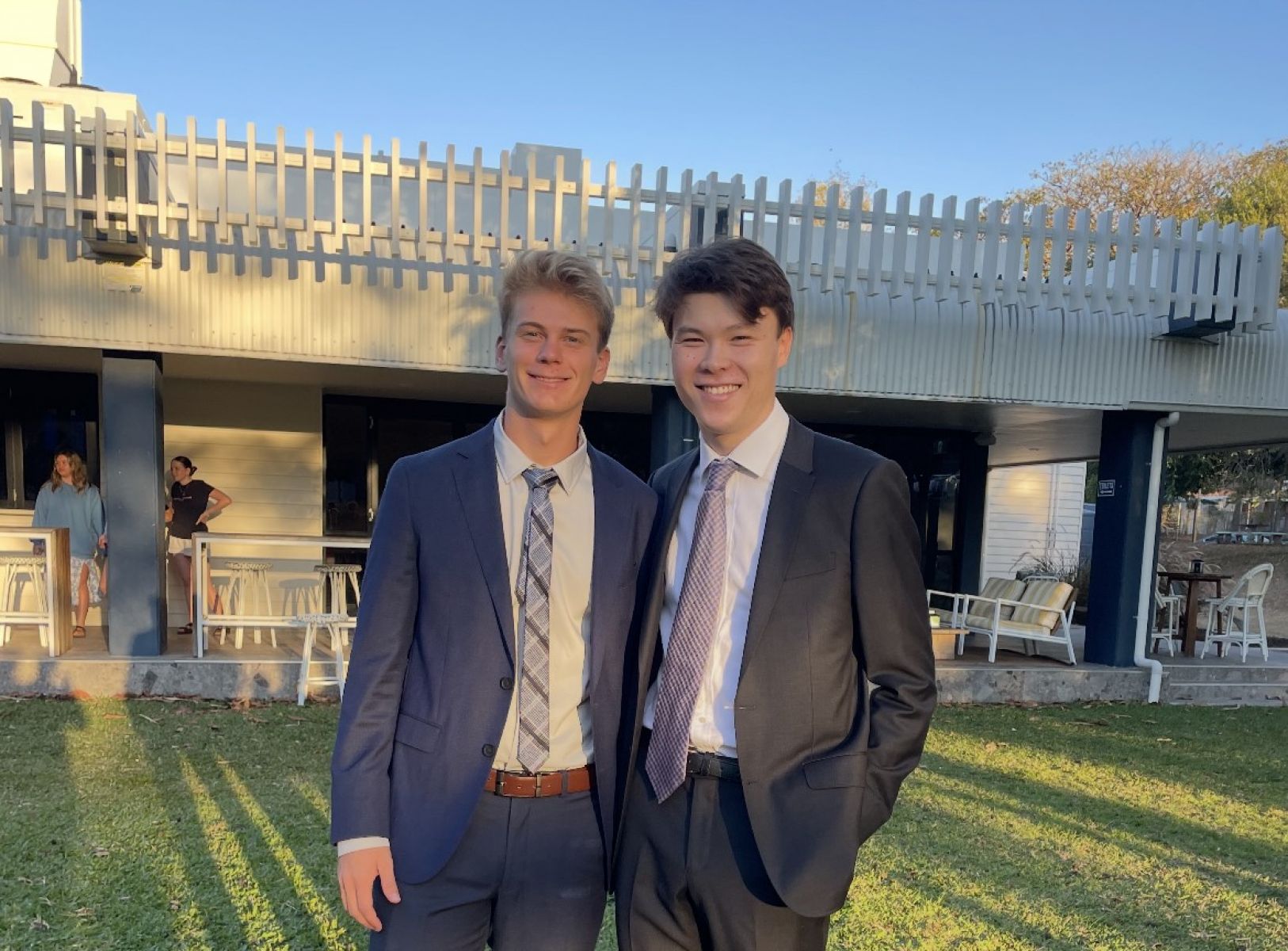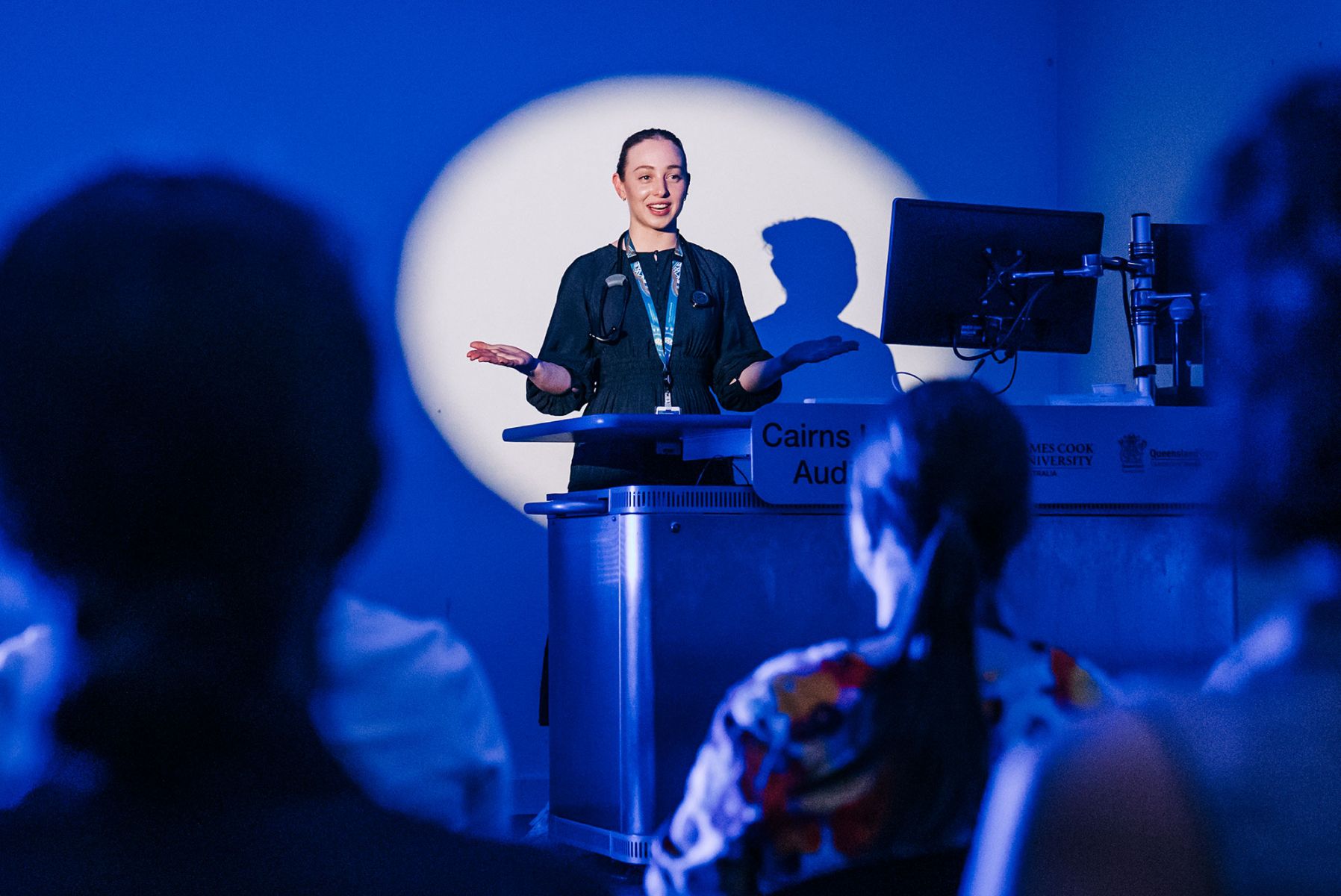7 August 2025
How research opportunities at JCU shape the next generation of medical professionals

When fourth-year JCU medical students Timothy Noack and Oliver Ma step up to present their first systematic review at the upcoming inaugural MED NORRTH (Northern Outcomes in Regional Research, Translation and Health) conference, they’ll be doing more than showcasing a research project — they’ll be stepping into a professional future shaped by curiosity, collaboration and a deep commitment to improving healthcare in regional Australia.
Held in Townsville and hosted by Northern Queensland Regional Training Hubs (NQRTH), the College of Medicine and Dentistry and the Tropical Australian Academic Health Centre (TAAHC), MED NORRTH offers a vital platform for medical students, junior doctors and early career health researchers to build research skills, exchange ideas and foster connections across the north.
For Professor Sarah Larkins, Dean of the College of Medicine and Dentistry, events like MED NORRTH are not only a celebration of academic inquiry — they’re a launchpad for impactful careers.
“It’s fantastic for junior doctors and senior medical students to have an opportunity to present their research in front of supportive peers,” she said.
“It can sometimes be a little intimidating when you're just starting off in research, presenting at conferences, and this is an excellent opportunity for staff to hear about some of the great work that's going on, and students and junior clinicians to hear about some of the research that other people in the system are doing.”
Research Grounded in Real-World Challenges
What sets JCU’s medical research apart is its connection to local communities and regional health needs.
Professor Larkins said many students and junior doctors are drawn to research that addresses real problems they see on the ground.
“A lot of local medical students and junior doctors get interested in doing small, clinically relevant research projects that respond to local need,” she said.
They see a problem in the system, they see a health concern that's not being responded to, and they get involved in research to fix it. So, it’s research with a real contemporary translational impact,” she said.
Medicine Impact Research Advisor Susan Wright agrees.
She said early exposure to research develops a broad range of competencies that strengthen clinical reasoning and communication — skills that will serve students well throughout their careers.
“Building research skills early in their medical education and training journey allows medical students and junior doctors to develop a broad range of competencies that are essential for future clinical practice,” Ms Wright said.
“This includes the ability to critically evaluate evidence, deepen their understanding of clinical care, and gain experience in data analysis, scientific communication, and evidence-based medicine.
“Early exposure to research fosters curiosity and confidence, encouraging a proactive approach to learning and innovation. Importantly, engaging in research within regional and rural contexts enables emerging clinicians to contribute meaningfully to medical research and work to towards improving health outcomes.”
From Classroom to Conference
For Timothy Noack and Oliver Ma, preparing for MED NORRTH has been an invaluable learning experience and a powerful introduction to the world of medical research.
Working alongside experienced mentors Principal Research Fellow Joe Moxon and Associate Professor Alex Trollope has given the students a solid foundation in research methodology and helped them gain confidence.
“They’ve taught us so many research skills very patiently,” Oliver said. “While it’s initially daunting —and still is — the skills you learn are invaluable as you graduate and progress throughout your career.”
“It’s an opportunity to contribute to the scientific literature in a field that interests me. Among other things, I have an interest in critical care and enjoyed neurology in MBBS2 and so thought this was a great field to work on my first paper in.”
Timothy had long been eager to explore research but, like many students, wasn’t sure how to get started.
“Both Ollie and I have always been very interested in getting involved in research but would often discuss how difficult it is to find the right project to start with,” Timothy said.
“When Ollie asked me to join him in doing the review with Joe, I was very excited to take on this new project. It’s been a great opportunity to contribute to the scientific community, even in a small way.”
The Power of Collaboration
One of the defining aspects of Timothy and Oliver’s research journey has been their collaboration. As close friends and classmates, they’ve learned to support one another through the inevitable learning curve that comes with tackling a first research project.
“There have been so many moments in the past months that I’ve been so glad to be working alongside Ollie,” Timothy said. “As new researchers, there’s a steep learning curve. At each of these points, having a close friend in Ollie that I can bounce ideas off, both teach and be taught (mainly taught), and learn together how to work our way through this project has been immensely helpful.”
Oliver echoed this sentiment. “We each have our own strengths and weaknesses. When I am struggling with one particular skill or stage of the project, often Tim is better at this and can help out, and vice versa. It’s been so helpful to go through our first project together.”
A Conference That Builds Confidence
Set to take place over one day in August, MED NORRTH will feature oral and poster presentations, a keynote address, panel discussion, and a hands-on workshop.
Its theme — “Building Research Skills to Advance Regional Health in Australia”— captures the spirit of the event and its commitment to local impact.
Susan Wright said the event will showcase a diverse range of research topics, including telehealth, medical education, and clinical outcomes.
“Students and doctors alike will be given the opportunity to present, participate in an interactive workshop, and engage in a panel discussion exploring the research journey from medical student through to becoming a well-established clinician/researcher,” Ms Wright said.
“Events such as MED NORRTH foster meaningful networking opportunities, helping attendees build connections and potential collaborations with peers, mentors, and experienced researchers. This exposure strengthens research confidence and enhances career development by boosting CVs and research profiles which are key assets for many specialist training pathways.”
The CMD Impact team and research officers from Mackay and Cairns have also worked behind the scenes to support students through abstract submission and preparation, helping to make the conference experience as smooth and empowering as possible — alongside the tireless efforts of the MED NORRTH Organising and Scientific Committees, whose dedication brought this event to life.
Looking Ahead: A Culture of Research at JCU
As the date of their presentation approaches, both Oliver and Timothy are excited — not just to share their findings, but to learn from others and connect with peers and mentors.
“Outside of the learning and skills from presenting, I think it will be a great space to meet and learn from other research-inclined medical students, junior doctors and researchers,” Timothy said.
“As a medical student at the start of my very long journey, it’s exciting to be in a room with such an inspiring group of individuals.”
Oliver agreed. “Medicine is so broad and there are so many fields to continue learning about. I’m keen to hear about the research my friends who are presenting have been doing.”
For both students, MED NORRTH is just the beginning.
“I would say to myself a year ago — stop overthinking it and just get in there and get started,” Timothy said. “Research was something I thought was way outside of my level of intelligence and scope, but everyone at JCU has been very engaged, encouraging and supportive.”
Oliver added, “Most doctors, even if they aren’t actively involved in research, need to interpret trials and studies to stay up to date with best practice. It’s really gratifying to work on a project to completion and get it published.”
Professor Larkins also reflected on her own introduction to research during medical school and how those early skills shaped her career.
“I first got involved in research between my third and fourth year of the Bachelor of Medical Science,” she said. “The research I did then involved baby rats and testicular descent, which was a world away from anything I do now. But it was a rewarding experience, and I’ve drawn on the skills I learned during that time throughout my career.”
A Foundation for the Future
Whether it’s learning to critically evaluate evidence, understanding complex clinical outcomes, or simply finding the confidence to ask meaningful questions, research is becoming an essential part of the modern medical toolkit.
For JCU medical students, it’s also a way to contribute to the health and wellbeing of regional communities from the very start of their careers.
“Our students are responding to real issues and engaging in research that makes a difference,” Professor Larkins said.
“That’s what makes the MED NORRTH conference — and JCU’s research culture — so powerful.”


NQRTH is an initiative of the Australian Government's Integrated Rural Training Pipeline (IRTP) and is facilitated by James Cook University in partnership with public and private hospitals, Queensland Aboriginal and Islander Health Council (QAIHC), health services, Aboriginal Community Controlled Health Organisations (ACCHOs) and GP clinics.
Cairns region
(07) 4226 7138
Central West region
(07) 4764 1547
Mackay region
(07) 4885 7122
North West region
(07) 4764 1547
Torres and Cape region
(07) 4095 6103
Townsville region
(07) 4781 3424





